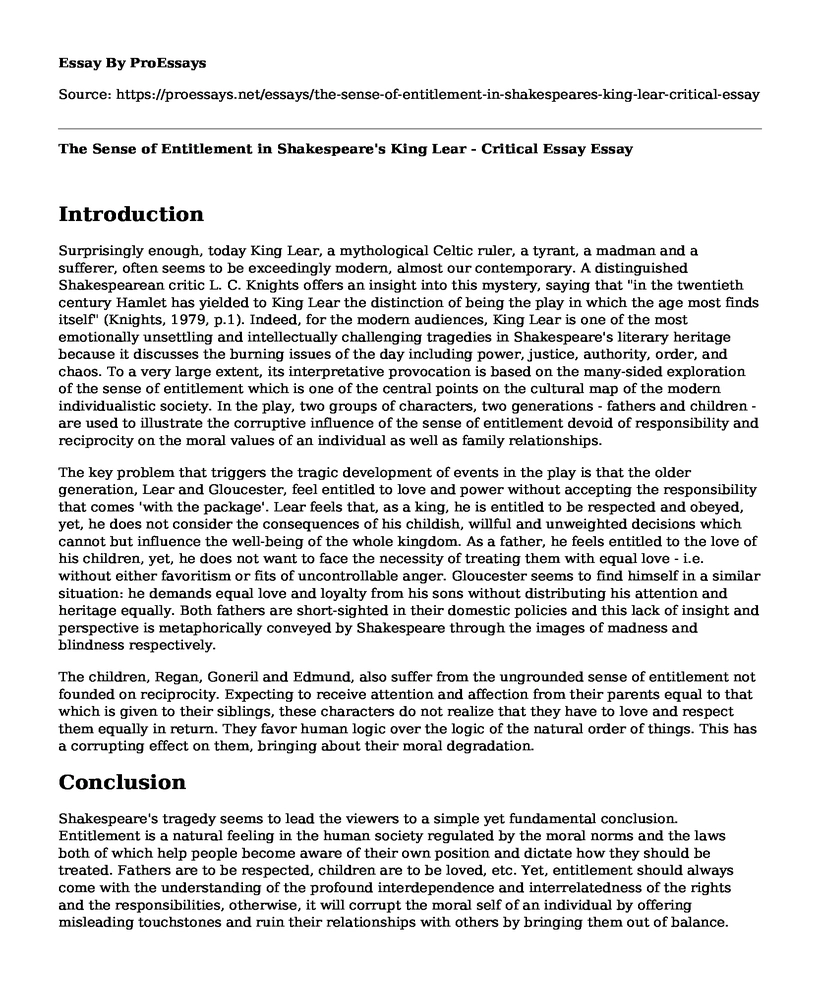Introduction
Surprisingly enough, today King Lear, a mythological Celtic ruler, a tyrant, a madman and a sufferer, often seems to be exceedingly modern, almost our contemporary. A distinguished Shakespearean critic L. C. Knights offers an insight into this mystery, saying that "in the twentieth century Hamlet has yielded to King Lear the distinction of being the play in which the age most finds itself" (Knights, 1979, p.1). Indeed, for the modern audiences, King Lear is one of the most emotionally unsettling and intellectually challenging tragedies in Shakespeare's literary heritage because it discusses the burning issues of the day including power, justice, authority, order, and chaos. To a very large extent, its interpretative provocation is based on the many-sided exploration of the sense of entitlement which is one of the central points on the cultural map of the modern individualistic society. In the play, two groups of characters, two generations - fathers and children - are used to illustrate the corruptive influence of the sense of entitlement devoid of responsibility and reciprocity on the moral values of an individual as well as family relationships.
The key problem that triggers the tragic development of events in the play is that the older generation, Lear and Gloucester, feel entitled to love and power without accepting the responsibility that comes 'with the package'. Lear feels that, as a king, he is entitled to be respected and obeyed, yet, he does not consider the consequences of his childish, willful and unweighted decisions which cannot but influence the well-being of the whole kingdom. As a father, he feels entitled to the love of his children, yet, he does not want to face the necessity of treating them with equal love - i.e. without either favoritism or fits of uncontrollable anger. Gloucester seems to find himself in a similar situation: he demands equal love and loyalty from his sons without distributing his attention and heritage equally. Both fathers are short-sighted in their domestic policies and this lack of insight and perspective is metaphorically conveyed by Shakespeare through the images of madness and blindness respectively.
The children, Regan, Goneril and Edmund, also suffer from the ungrounded sense of entitlement not founded on reciprocity. Expecting to receive attention and affection from their parents equal to that which is given to their siblings, these characters do not realize that they have to love and respect them equally in return. They favor human logic over the logic of the natural order of things. This has a corrupting effect on them, bringing about their moral degradation.
Conclusion
Shakespeare's tragedy seems to lead the viewers to a simple yet fundamental conclusion. Entitlement is a natural feeling in the human society regulated by the moral norms and the laws both of which help people become aware of their own position and dictate how they should be treated. Fathers are to be respected, children are to be loved, etc. Yet, entitlement should always come with the understanding of the profound interdependence and interrelatedness of the rights and the responsibilities, otherwise, it will corrupt the moral self of an individual by offering misleading touchstones and ruin their relationships with others by bringing them out of balance.
Reference
Knights, L. C. (1979). "Hamlet" and other Shakespearean essays. Cambridge: Cambridge University Press.
Cite this page
The Sense of Entitlement in Shakespeare's King Lear - Critical Essay. (2022, May 02). Retrieved from https://proessays.net/essays/the-sense-of-entitlement-in-shakespeares-king-lear-critical-essay
If you are the original author of this essay and no longer wish to have it published on the ProEssays website, please click below to request its removal:
- Essay Sample - Love is Equal to Cholera as Written by Gabriel Garcia Marquez
- Symbols in "Hills Like White Elephants" by Ernest Hemingway
- Essay on The Ferryman: Act 3 Scene - A Thatcher-Era Guerrilla War
- Analysis of Sophocles' Antigone Essay Example
- Paper Example on Ovid: Celebrated Roman Poet and Artist's Influential Legacy
- The Lottery by Shirley Jackson Essay Example
- Literary Analysis Essay on Milosz Poetry







